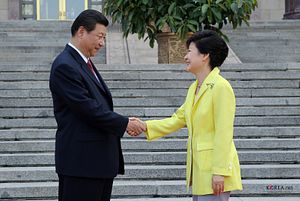China’s ambassador to South Korea recently warned the opposition Minjoo Party of Korea (MPK) that the deployment of a U.S. missile defense system could “destroy” the China-South Korea relationship. MPK spokesperson Kim Sung-soo quoted Ambassador Qiu Guohong’s comments, made in a meeting with MPK chairman Kim Chong-in, to the Korean media this week, saying Qiu had asked that his comments be made public.
China has strenuously objected to the deployment of the Terminal High Altitude Area Defense System (THAAD) on the Korean Peninsula for years. The United States and South Korea say THAAD is a purely defensive system, and a necessary means of protecting against the North Korean missile threat. China, however, believes THAAD would also be used to monitor Chinese missile deployments, posing threat to China’s national security.
In the wake of North Korea’s nuclear test in January and rocket launch a month later, however, South Korea and the United States have moved closer to THAAD deployment. For the first time, the two sides are poised to begin official negotiations on the details of setting the system up in South Korea. That has sparked a backlash in China, including dire warnings of escalation that could spark a potential arms race in the region.
Qiu’s comments to the MPK fit squarely in that vein. According to Kim Sung-soo, Qiu said that THAAD deployment could negate the advances made in China-South Korea ties in the past three years under Presidents Xi Jinping and Park Geun-hye. “Much effort has been made to develop bilateral ties to today’s level, but these efforts could be destroyed in an instant with a single problem,” Qiu said, warning that ties “could take a long time to recover.”
He also warned that THAAD deployment would “create a vicious cycle of Cold War-style confrontations and an arms race,” and urged South Korea to take that into account when deciding if THAAD truly makes the country safer.
In particular, Qiu expressed concern about the level of U.S. control over the system. He said China would trust South Korea to limit the functions of THAAD so as not to target China, but did not believe similar assurances from the United States. “I do not deny the fact that THAAD would play a role in protecting [South] Korea, but it will inevitably target China and Russia,” Qiu said.
China’s Foreign Ministry made a similar point on Wednesday, with spokesperson Hua Chunying telling reporters that “the Chinese side understands the ROK’s reasonable security concerns, but no country can pursue its own security interests at the expense of others.” THAAD deployment “will have a direct impact on China’s national security interests,” Hua added.
In response to the latest round of protests from China, South Korean presidential spokesperson Jung Youn-kuk said that THAAD deployment “is a matter we will decide upon according to our own security and national interests.”
“The Chinese had better recognize this point,” Jung added. The floor leader of the ruling Saenuri Party, Rep. Won Yoo-chul, went further, calling Qiu’s comments “blackmail.”
South Korea has been frustrated that close ties with China — the “best-ever national ties in history,” according to Xi — haven’t resulted in any willingness to apply more pressure on North Korea. South Korea’s movement on THAAD is a signal to China that Seoul will do what it must to defend itself—that the way to stop THAAD deployment is to stop North Korea’s missile and nuclear programs.
However, the United States and South Korea recently postponed the start of talks on THAAD deployment, calling off a ceremony scheduled for Tuesday that would have seen both sides sign an agreement on the talks. A spokesperson for South Korea’s Defense Ministry refused to comment on speculation that the official start of THAAD talks was delayed to avoid upsetting U.S.-China negotiations over UN sanctions on North Korea. Instead, he said the allies had yet to finalize all the details of the joint working group that will carry out the talks.
Qiu, though, made it clear that the THAAD issue was affecting the UN Security Council talks. “Without the THAAD issue, a new UN resolution would have been adopted already,” he told MPK officials.
































